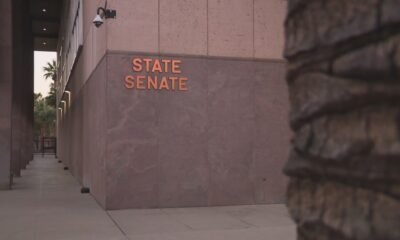arizona
Audit Reveals Arizona’s Struggles in Tracking Voter Citizenship
An audit released by Governor Katie Hobbs has uncovered significant flaws in Arizona’s voter citizenship tracking system, tracing issues back over two decades to decisions made by the Motor Vehicle Division (MVD) regarding driver’s license classifications. The investigation highlights the complexity of the situation, revealing that the problems extend beyond merely coding glitches, as earlier suggested.
The comprehensive review was initiated after a concerning discovery that over 200,000 voters were registered to cast full ballots without having provided proof of citizenship, a requirement for voting in state and local elections. In response, Hobbs commissioned a study in September, tasking former recorders Patty Hansen and Robyn Stallworth-Pouquette with a thorough examination of relevant MVD policies and practices.
The audit identified three key findings. One of the most critical issues involves a loophole in state law affecting individuals born in American Samoa and Swains Islands. While these individuals are U.S. nationals—capable of obtaining a U.S. passport—they lack full citizenship rights. Remarkably, Arizona recognizes U.S. passports as valid proof of citizenship for voting purposes, which may unintentionally allow U.S. nationals to register despite lacking full citizenship documentation.
Addressing this loophole would require a legislative change to enforce accurate verification of citizenship documentation for U.S. nationals.
The second issue highlighted the need for enhanced communication between the Secretary of State’s Office and the MVD. The Secretary’s Office manages the voter registration database for most counties, but discrepancies have arisen when county recorders attempt to verify citizenship status using MVD information. Following the audit, both agencies have pledged to increase collaboration, and training for election officials on MVD procedures will commence with certification.
Lastly, the auditors advised ensuring that citizenship statuses for inactive MVD records are regularly updated. Many discrepancies arise from these records, particularly among residents with expired or canceled licenses, who may not have accurate citizenship data on file.
Another significant finding revealed that county recorders primarily rely on driver’s license information to confirm citizenship, but since 2020, the MVD inaccurately classified individuals with pre-1996 licenses as citizens. This misclassification stemmed from the fact that these licenses did not require proof of citizenship at the time of issuance. As such, when checking records, county officials could mistakenly perceive these residents as having legitimate citizenship proof.
A long-standing issue since 2007 further complicated matters: the secretary’s system did not accurately catalogue each driver’s license issuance date, leading to misleading citizenship verifications when licenses were renewed.
State officials have since taken steps to correct these issues within their databases to provide accurate citizenship information to county officials. As local elections loom, county recorders are working against the clock to inform affected voters that they must furnish proof of citizenship to participate in the upcoming elections.


















